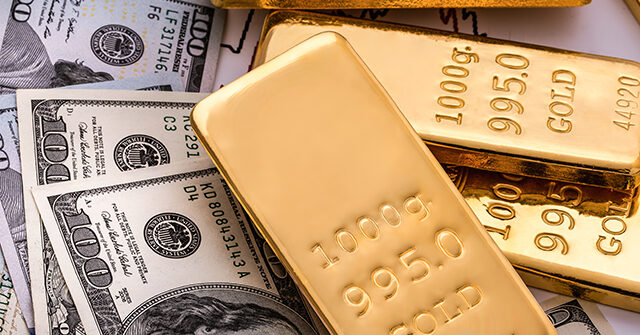Carney on ‘Kudlow’: The Price of Gold Could Get Above $2K
The price of gold has been on the rise and could get above $2,000, Breitbart Economics Editor John Carney said in an interview Tuesday on Larry Kudlow’s eponymously named Fox Business show.

The price of gold has been on the rise due to multiple factors, including the market’s response to the Congressional debt ceiling fight and any efforts by U.S Treasury Secretary Janet Yellen to stave off a possible debt default by engaging in what Kudlow characterized as “stealth quantitative easing.” To this list, Carney added two other possible factors driving up the price of gold. “I think the Saudi Arabians saying they’ll be willing to take things other than dollars is a very big factor,” he said. Carney said another factor is “the apparent easing of conditions in Europe where it doesn’t look like the recession that we thought they would already be in is going to be as bad or if it’s going to happen at all. That makes European assets more attractive.” “Last year, people were looking to buy all sorts of dollar denominated assets,” he explained. “The dollar has declined a bit. I think that’s helped gold as well. And, so, I think we’re seeing a move away from some of the global recession trades that were going on into people diversifying their portfolios a bit, and that’s put a bid on gold.” “I think gold goes higher,” Carney concluded. “I don’t think it goes up another $300 from here, but I do think it gets above 2,000.” Dan Clifton of Strategas Securities explained that while all of these factors are driving up the price of gold, the long-term impact on the U.S. dollar remains unknown. “I never say the dollar is going to collapse. I’m saying gold is going up,” Clifton told Kudlow. “What we see is that central banks around the world are buying gold. This is China. This is the Saudis. This is Russia. This is India. You’re starting to see a multipolar world develop.
They’re trying to develop a gold-backed reserve currency. It’s going to take years to do that.
The Saudis would have to replace their security agreement with the United States. But incrementally you’re moving in that direction.
The Saudis opened up last week the idea of trading oil in other currencies. That may or may not happen, but that’s a change on the margin. By itself it’s probably not enough, but it’s acting in tandem with all these other factors that are happening. This is the first time since the equity market bottomed since Bretton Woods that gold was outperforming the S&P 500 very seriously.” Saudi Arabian Finance Minister Mohammed al-Jadaan told an audience last week at Davos that his country is willing to reconsider its decades-old “petrodollar” agreement to peg its currency to the U.S. dollar and to price its oil in U.S. dollars on the international market, Breitbart’s John Hayward reported: Decoupling the riyal from the dollar would be a major change for both countries and for the global oil market. Analysts have long considered such a change potentially cataclysmic but unlikely, especially while the Saudis are embarked on Crown Prince Mohammed bin Salman’s Saudi Vision 2030, an ambitious reform agenda to diversify their economy away from petroleum. Al-Jadaan said at the World Economic Forum (WEF) in Davos that Saudi Arabia is open to considering other currencies. “There are no issues with discussing how we settle our trade arrangements, whether it is in the U.S. dollar, whether it is the euro, whether it is the Saudi riyal. I don’t think we are waving away or ruling out any discussion that will help improve the trade around the world,” he said. Al-Jadaan said the Saudis wish to develop economic flexibility so they can build stronger economic relationships with other partners, specifically mentioning China, an eager customer for all manner of fossil fuels. “We enjoy a very strategic relationship with China and we enjoy that same strategic relationship with other nations including the U.S. and we want to develop that with Europe and other countries who are willing and able to work with us,” he said. Read the rest here.
Read the full article at the original website
References:
- https://video.foxbusiness.com/v/6319192497112#sp=show-clips
- https://www.breitbart.com/terms-of-use/
- https://www.breitbart.com/privacy-policy/
- https://www.breitbart.com/middle-east/2023/01/18/saudi-arabia-ready-to-consider-other-currencies-besides-dollar-for-trade/
- https://www.breitbart.com/national-security/2016/04/26/saudi-arabia-approves-plan-post-oil-economy/
- https://www.bloomberg.com/news/articles/2023-01-17/saudi-arabia-open-to-talks-on-trade-in-currencies-besides-dollar#xj4y7vzkg
